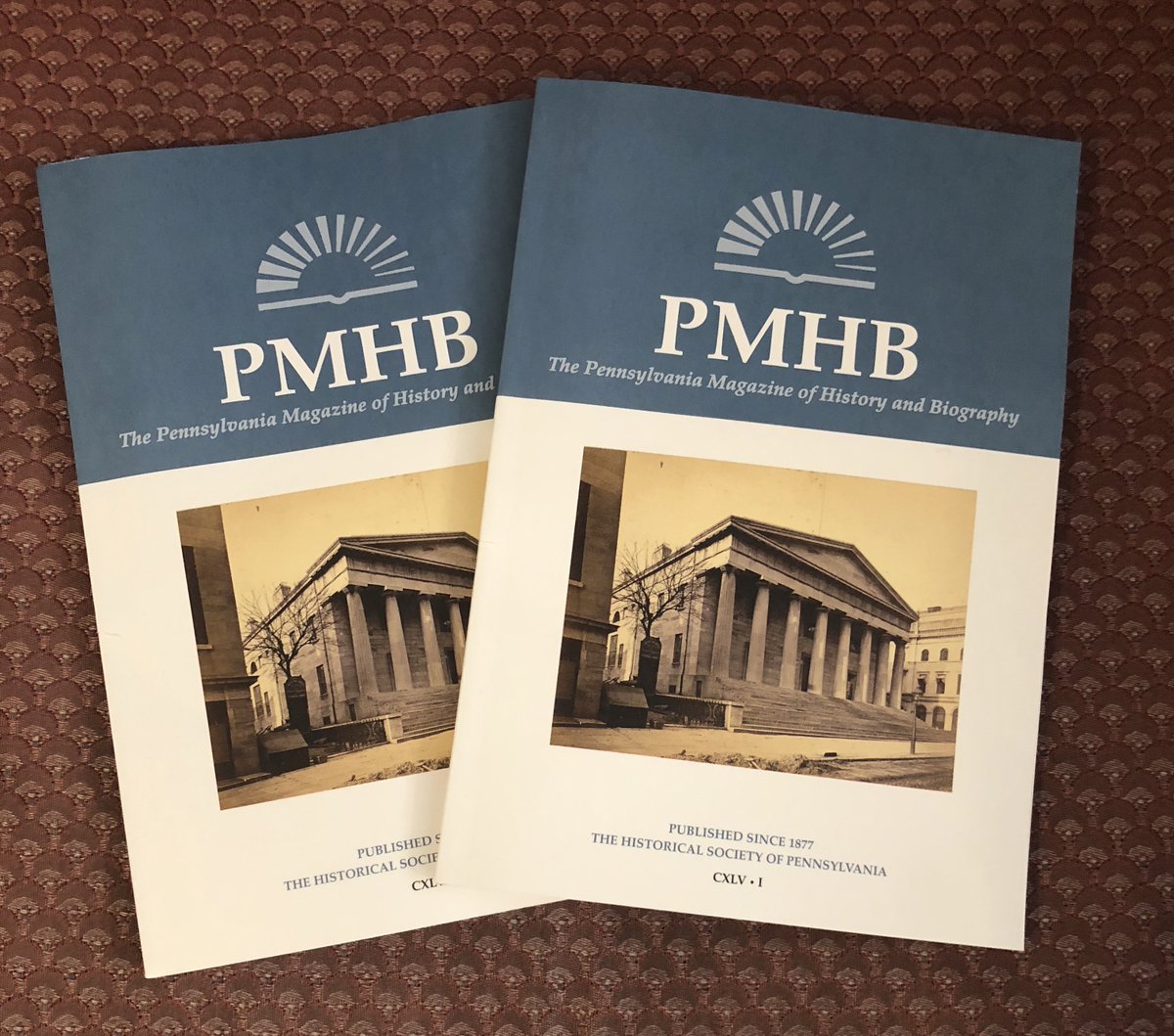
1. THREAD. Why is anti-statist resistance to federal support for health insurance, vaccines, voting rights, environmentalism, women’s rights, and collective bargaining so prevalent in the American South?
As I argue here a major reason lies in the region’s history of slavery.


As I argue here a major reason lies in the region’s history of slavery.


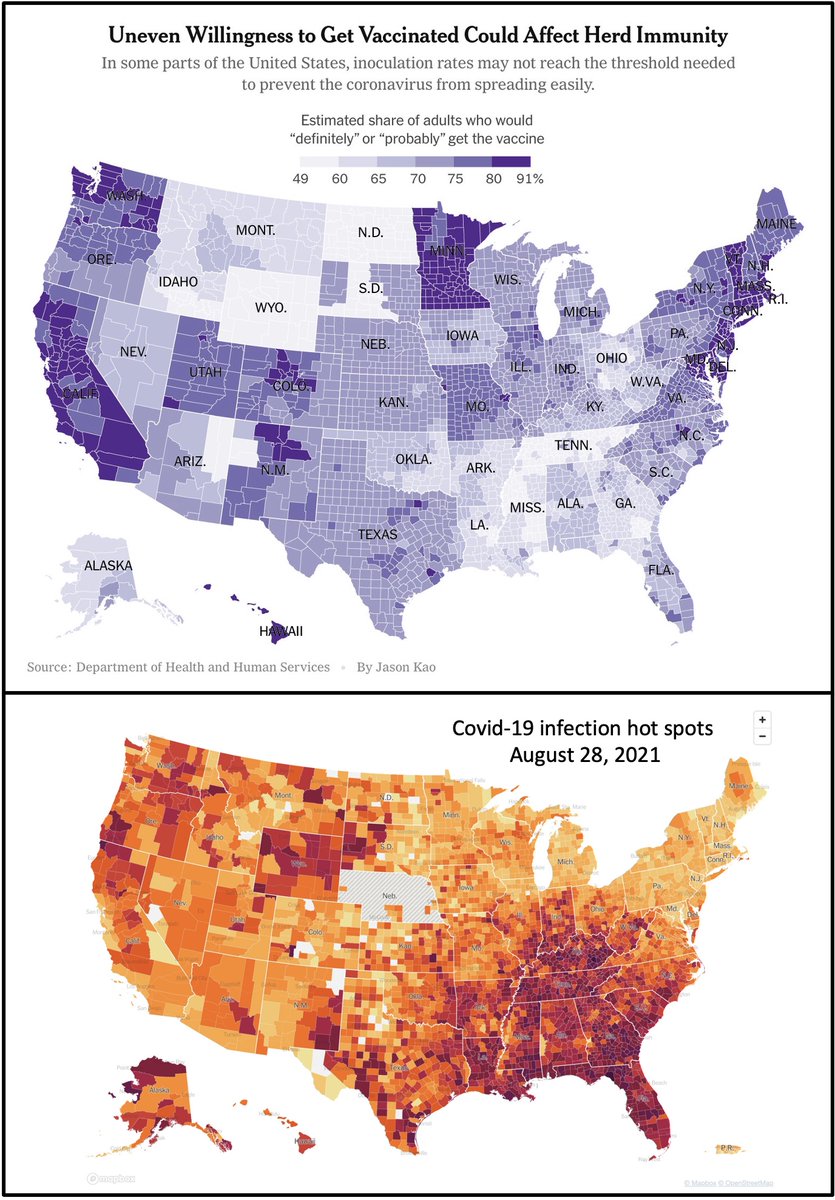
2. This thread was inspired by a response to @arielronid's excellent article in Slate. For years I had known about the slavery—limited government relationship but now I wanted specific, verifiable proof in the primary sources.
slate.com/news-and-polit…
slate.com/news-and-polit…
3. The passages below show that in the U.S. context proposals for limited government, states’ rights, and low taxes were often intertwined with and shaped by a desire to preserve slavery and racial hierarchy, often in contrast to more egalitarian and majoritarian proposals.
4. Greater attention to these texts allows for a better understanding of the political discourses of the antebellum era and their long-term effect on today’s culture.
Toward the end I address the rebuttals and complexities of this issue in my own Q & A session.
Toward the end I address the rebuttals and complexities of this issue in my own Q & A session.
5. Let’s get into the textual evidence from 10 white southern politicians in the antebellum era.
6. Example #1: Nathaniel Macon to Bartlett Yancey, March 8, 1818
Citation: Edwin Mood Wilson, The Congressional Career of Nathaniel Macon, pp. 48—49
google.com/books/edition/…
Citation: Edwin Mood Wilson, The Congressional Career of Nathaniel Macon, pp. 48—49
google.com/books/edition/…

7. Macon to Bartlett Yancey, December 8, 1825
Wilson, The Congressional Career of Nathaniel Macon, pp. 76—77
“General government” was the term that many antebellum Americans, especially southerners, used to refer to the federal or national government in Washington D.C.
Wilson, The Congressional Career of Nathaniel Macon, pp. 76—77
“General government” was the term that many antebellum Americans, especially southerners, used to refer to the federal or national government in Washington D.C.

8. Example #2: Speech from Representative Charles Pinckney of South Carolina on the topic of admitting slaves into Missouri, February 1820
memory.loc.gov/cgi-bin/ampage…
Warning: this is deeply racist and difficult to stomach
memory.loc.gov/cgi-bin/ampage…
Warning: this is deeply racist and difficult to stomach
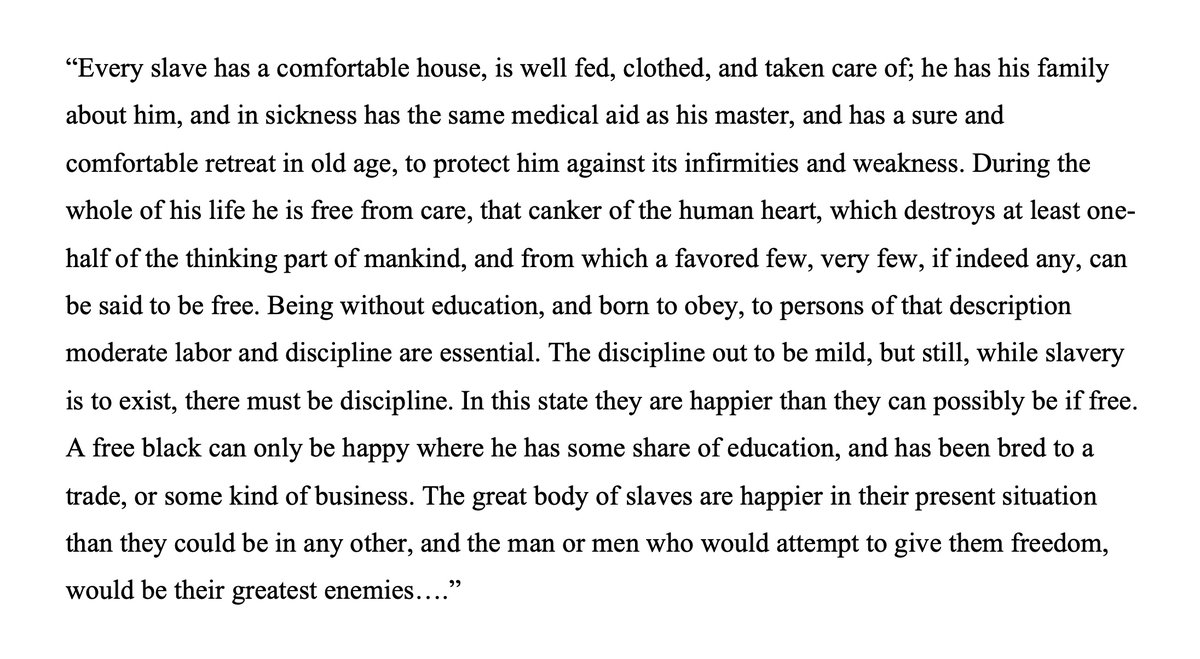
9. Traditionally we learn that the founders saw slavery as a necessary evil with “positive good” arguments coming only in the 1830s. Yet not only was Pinckney a founder but as John Majewski once told me, positive good arguments were evident in 1820 at the Missouri debates.
10. These shocking, horrifying points from Pinckney resembled ones later invoked by George Fitzhugh in Cannibals All! and James Henry Hammond in the "mudsill" speech.
@zachdowdle , @LawrenceCelani @jlpasley
@zachdowdle , @LawrenceCelani @jlpasley
11. Pinckney was one of 4 SC delegates to Philadelphia in 1787 who played major roles in demanding and inserting the 3 pro-slavery clauses in the original U.S. Constitution. Pierce Butler, John Rutledge, and Charles Cotesworth Pinckney were the others.
https://twitter.com/Historian_Steve/status/1287635012313952257
13. Enslavers like Pinckney looked to the Constitution to protect slave property in the face of what they perceived as hostile northern majorities. Their justification was states’ rights as one of the core characteristics of limited government philosophy.
14. It’s not hard to find examples of conservatives today defending their positions by citing the founders and the Constitution. Ben Shapiro recently gave a states’ rights argument when he said, “Let Texas be Texas.”
14. It’s not hard to find examples of conservatives today defending their positions by citing the founders and the Constitution. Ben Shapiro recently gave a states’ rights argument when he said, “Let Texas be Texas.”
15. We see the belief in limited government in Pinckney’s demand that Congress not touch the slave question. Only the individual states in his mind could do this. Calhoun would later develop this theory by underscoring the 5th Amendment’s protection of private property.
16. The right to slave property was so fundamental according to Calhoun that no legislative majority could violate it. Roger B. Taney adopted Calhoun’s view in the infamous Dred Scott decision, declaring that Congress could not prohibit slavery in the western territories.
17. It's striking that many conservatives & libertarians today also uphold an absolutist vision of property rights when fighting environmental regs. They ground their call for limited govt in a mythologized version of what the founders intended in the original constitution.
17. It is striking that many conservatives and libertarians today also uphold an absolutist vision of property rights when fighting environmental regs. They ground their call for limited govt in a mythologized version of what the founders intended in the original constitution.
18. Example #3: Robert Hayne of South Carolina discussing the American Colonization Society in the Senate, March 1826.
memory.loc.gov/cgi-bin/ampage…
memory.loc.gov/cgi-bin/ampage…

19. Owning slaves was a fundamental right, not open for public discussion in Congress. It is remarkable that even several years before the nullification crisis, Hayne and his ilk were contemplating secession.
20. Example #4: William Smith, circa 1824—30
This letter is taken from William Freehling, Prelude to Civil War, p. 118
google.com/books/edition/…
This letter is taken from William Freehling, Prelude to Civil War, p. 118
google.com/books/edition/…

21. Example #5: Robert Turnbull, The Crisis, published under the pseudonym “Brutus” in 1827. This passage is from p. 64 of the Crisis.
google.com/books/edition/…
google.com/books/edition/…

22. Congress enacted tariffs, sponsored internal improvements, and established a National Bank through the “general welfare” clause of the Constitution. Turnbull and others like him feared that this clause could then be used to meddle with slavery.
23. Petitions to Congress from the American Colonization Society were a case in point. Thus, fears over “Big government” in the South today can be traced back to antebellum era debates over Congress’s right to debate slavery.
24. Broadly speaking, there were two wings of the Jeffersonian coalition debating the limits of the general welfare clause in the aftermath of the War of 1812: the Albert Gallatin / early Calhoun wing versus the John Randolph / Quids, strict construction, Old Guard wing.
25. The exigencies of war and spirit of nationalism surrounding war with Britain gave the Gallatin / Calhoun wing the upper hand from 1815—1820 as some strict constructionists like Madison and Monroe put aside their scruples.
26. But the Missouri debates, Denmark Vesey’s attempted revolt, and the American Colonization society made slavery the Big Elephant in the room. Strict constructionists like Hayne and Turnbull then seized the initiative.
27. From Robert Turnbull, the Crisis, pp.96-97
Turnbull here put forth the compact theory of the Constitution, something Chief Justice John Marshall rejected in McCulloch v. Maryland.
Turnbull here put forth the compact theory of the Constitution, something Chief Justice John Marshall rejected in McCulloch v. Maryland.

28. The compact theory held that the Constitution, rather than creating a government for all of the American people, was instead an agreement among independent sovereign states that could be severed at any point.
29. States’ righters wielding the compact theory liked to think of Philadelphia 1787 as a meeting of disparate peoples from independent nations with vastly different traditions who sacrificed their sovereignty *only* for the purposes of commerce and national defense.
30. If you’ve studied the secession documents in 1860—61, you’ll see the compact theory in action, along with the obvious pro-slavery defenses.
31. There was a certain convenience in white southerners adopting the compact theory. White southerners often noted how they were a numerical minority, so the anti-majoritarian, anti-democratic compact theory preserved their bargaining power.
32. Anti-majoritarianism exists in every part of the U.S., but especially in the South. This is unsurprising when we consider the politics of South Carolina. Its small planter elite acquired disproportionate power even when most of the population lived in the upcountry.
33. Property requirements for voting in South Carolina stayed intact long after other states had abolished them. It was one of only two states—the other being Mississippi—to have a black majority in 1860 and it’s no coincidence it was the first to secede in 1860.
34. When I think of today’s Republicans relishing the filibuster, praising the founders uncritically and thinking it’s completely ok for California to have equal representation in the Senate with Wyoming despite a population difference of 70x, I see echoes of the antebellum era.
35. Today we see an ostensibly neutral but radically conservative Supreme Court bending over backwards to give a free pass to Republican state legislatures in their efforts to enact abortion restrictions, voter suppression, and gerrymandering.
36. The nostalgia undergirding originalism and the legal theory of federalism that upholds dual power-sharing between the states and Congress is similar to the nostalgia of antebellum era Americans when it came to Philadelphia and the compact theory.
37. Turnbull, The Crisis pp. 127—128
If Congress discusses slavery even indirectly, we’ll wind up poor like the West Indies. Talk about hyperbole! I’m reminded of similarly problematic slippery slope args like “if we don’t control spending or debt, we’ll wind up like Venezuela!”
If Congress discusses slavery even indirectly, we’ll wind up poor like the West Indies. Talk about hyperbole! I’m reminded of similarly problematic slippery slope args like “if we don’t control spending or debt, we’ll wind up like Venezuela!”

38. Turnbull, The Crisis, 129—130
One of the long-standing themes of southern history that emerges loud & clear in this passage is the fear of outside influence. Study the Civil Rights Movement of the 1950s and 60s and you’ll see white southerners lambasting “outside agitators”
One of the long-standing themes of southern history that emerges loud & clear in this passage is the fear of outside influence. Study the Civil Rights Movement of the 1950s and 60s and you’ll see white southerners lambasting “outside agitators”

39. This creation of a closed society and fear of outsiders was born out of slavery in my view. Remember, the South was relatively late in the western world in abolishing slavery – only Brazil and Cuba were later. So they were constantly defensive and sensitive to criticism.
40. @karpmj discusses this in his book. And I’d add that William Seward, in his famous “Irrepressible Conflict” speech of 1858, said the slave system was one of “constant danger, distrust, suspicion, and watchfulness.”
originalsources.com/Document.aspx?…
originalsources.com/Document.aspx?…
41. Turnbull spends a great deal of time in The Crisis talking about Hamilton, the tariff, robbery, the colonial dependency of the South, etc. And then he comes right out and says this. No highlights from me this time. Just read this powerful stuff. 
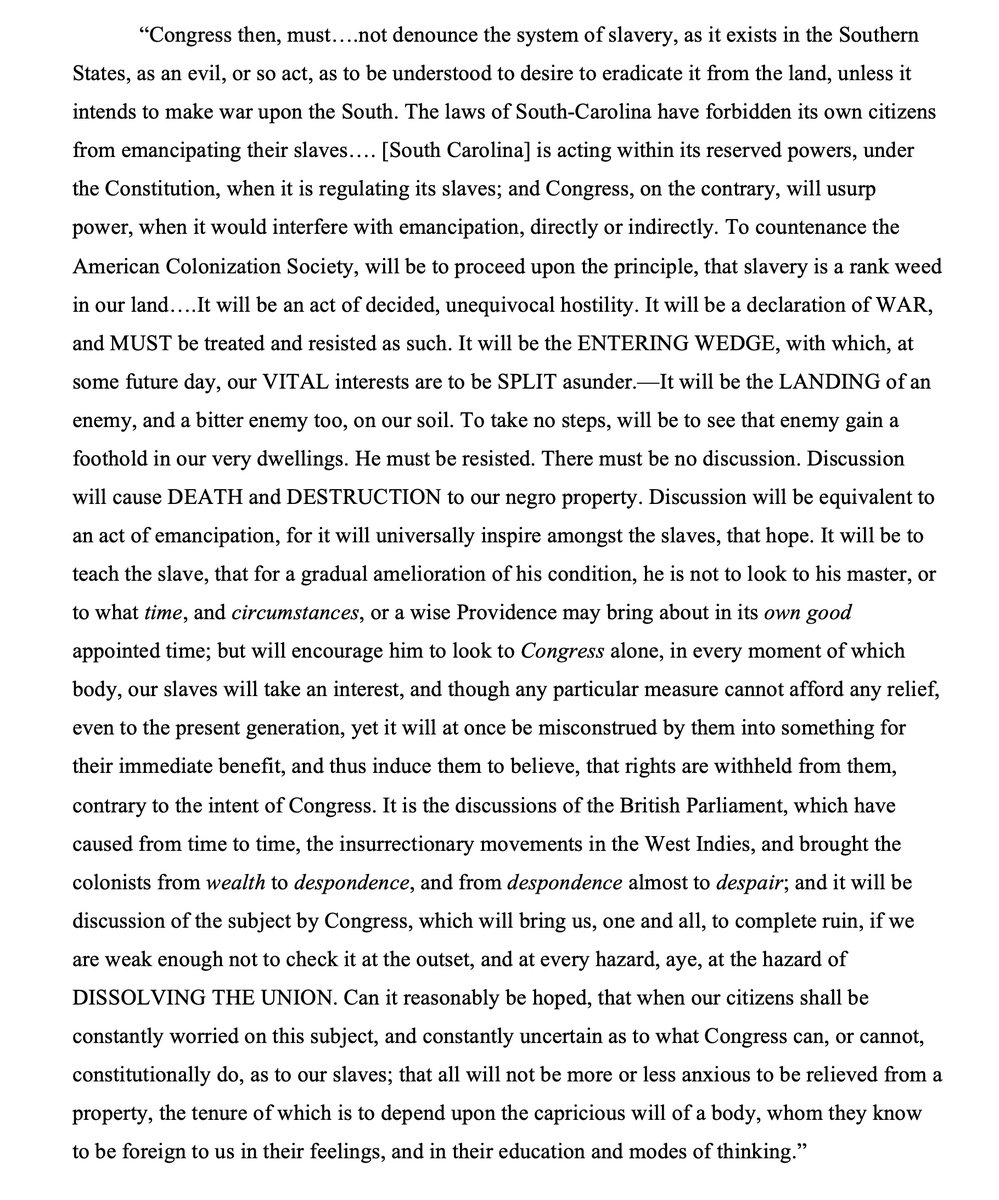
42. Study passages like these for long enough and you’ll see the hyperbole; the paranoia; the sensitivity; the defensiveness. They say don’t criticize us or we’ll secede. These are the emotions of a ruling class that fears its oppressed laborers will rise up and kill them.
43. There are numerous connections between nullification and slavery. Support for nullification tended to be strongest among enslavers in the large slaveholding counties. Turnbull himself was a leading nullifier and free trader who served on the Denmark Vesey court.
44. Check out the Wikipedia entry on Turnbull. It’s pretty awful. It mentions nullification but says almost nothing on slavery. Is there anyone who wants to fix this?
en.wikipedia.org/wiki/Robert_Ja…
en.wikipedia.org/wiki/Robert_Ja…
45. Example #6: William Preston, letter to Waddy Thompson, February 14, 1830, from Freehling, Prelude, p. 205
Freehling took this quote from a letter in the Richard Kenner Crallé Papers, a manuscript collection. Preston was talking about the nullifiers’ confidence.
Freehling took this quote from a letter in the Richard Kenner Crallé Papers, a manuscript collection. Preston was talking about the nullifiers’ confidence.

46. Example #7: John C. Calhoun, letter to Virgil Maxcy, September 11, 1830, from Freeling, Prelude, p. 257. 

47. We should remember that politicians sometimes referred to slavery euphemistically. Calhoun’s letter above is an example when he says “domestic institutions.”
@joefrancis505 @cd_reyes87
@joefrancis505 @cd_reyes87
48. “our interests,” “our property,” “our liberty,” “other persons” (the words in the original Constitution) and “servile revolt” are other common phrasings. Turnbull was direct but he was also publishing pseudonymously.
49. There may be several incentives for avoiding a direct mention of slavery as one’s primary motive, especially if one is trying to present one’s society in the best possible light. The rare times when they mention slavery so prominently deserve extra attention in my view.
50. Example #8: James Hamilton, Jr., Charleston Mercury, September 29, 1830.
This link contains the Mercury from the 28th and 29th, successively.
news.google.com/newspapers?nid…
This link contains the Mercury from the 28th and 29th, successively.
news.google.com/newspapers?nid…

51. Example #9 – The United States Telegraph, anonymous editorial from another newspaper, February 25, 1833. 




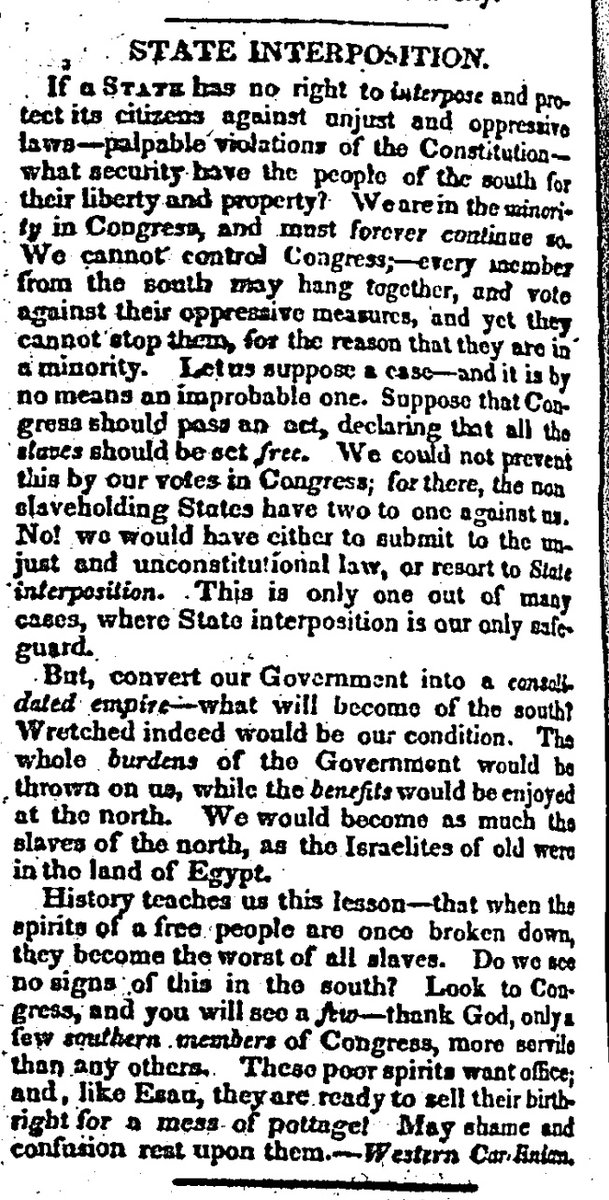
52. The Telegraph was a state-sponsored newspaper organ edited by Duff Green, a Calhoun devotee. I discuss Green’s business practices as an editor in my book.
amazon.com/gp/product/070…
William Stephen Belko has a monograph on Green: amazon.com/Invincible-Duf…
amazon.com/gp/product/070…
William Stephen Belko has a monograph on Green: amazon.com/Invincible-Duf…
53. They literally thought they might be *enslaved* if they weren’t careful. I’m reminded of Samuel Johnson’s famous quote about liberty and the “drivers of negroes.”
54. A less critical reading would be that those who grew up in a slave society were hyper-sensitive about any sort of relationship that reeked of subjugation. They knew chattel slavery was the worst of all labor conditions and they wanted to avoid it.
55. Example #10: Judge William Harper, Convention Speech, March 11, 1833, from this book, pp. 49—50
google.com/books/edition/…
google.com/books/edition/…

56. Okay, now I’ll move on to the nuances and objections to the argument that limited government philosophy in the U.S. reflected slave interests. The questions are ones I’ve thought about and the answers are mine.
57. Question: Is it helpful conceptually to use the weak state/strong state binary? Isn’t the reality more complex? @AsheeshKSi @FarberHannah 

58. Question: You’ve presented compelling evidence that proponents of limited government philosophy in the U.S. were very concerned about protecting slavery. But what about conservatism in other countries? 

60. Question: The texts you present show white southerners emphasizing property rights and slavery, but didn’t property rights and slavery thrive for hundreds of years prior to Europeans arriving in the American South? 

61. Question: Isn’t it difficult to link Calhoun and the nullifiers to today’s Republicans if the latter don’t cite the former as an influence? It seems that Republicans look more to Burke, Jefferson, and Locke, not Calhoun. @willwilkinson
modelcitizen.substack.com/p/the-density-…
modelcitizen.substack.com/p/the-density-…

62. I'd add that Turnbull invoked Burke approvingly in the Sept 29th edition. I came across this while looking for something else.
news.google.com/newspapers?nid…
news.google.com/newspapers?nid…

63. Question: So are you saying there’s a direct line between the South’s nullifiers and today’s conservatives?
historianstevecampbell.com/blog/in-progre…
@tzimmer_history @AngieMaxwell1
https://twitter.com/Historian_Steve/status/1156484000275300352?s=20
historianstevecampbell.com/blog/in-progre…
@tzimmer_history @AngieMaxwell1

64. See links and images
papers.ssrn.com/sol3/papers.cf…
journals.uchicago.edu/doi/10.1086/68…
historianstevecampbell.com/blog/the-probl…


papers.ssrn.com/sol3/papers.cf…
journals.uchicago.edu/doi/10.1086/68…
historianstevecampbell.com/blog/the-probl…



65. The connections of anti-tax sentiment and race.
This was a really good tweet from @HC_Richardson

This was a really good tweet from @HC_Richardson
https://twitter.com/HC_Richardson/status/1121895350309142529

66. Some of my previous thoughts and links on the Tea Party are relevant here.

https://twitter.com/Historian_Steve/status/1251900142027894784

67. And now onto some of my concluding thoughts…
68. This exercise started out as what I thought would be a brief foray into tracking down textual evidence for someone who seemed skeptical of the relationship between slavery and limited government. Then I realized there were a lot of related points I wanted to underscore.
69. Occasionally you do come across interpretations from the general public that are reminiscent of the Lost Cause—it was states’ rights or tariffs or economic differences, not slavery—that led to the Civil War.
70. Not too long ago libertarian Judge Napolitano made this argument on The Daily Show. Thankfully three scholarly historians, Eric Foner, Manisha Sinha, and James Oakes, successfully rebutted him. @DavidAstinWalsh
71. It’s only in the last ten years, I think, that Confederate flags and statues have become unacceptable among the general populace of the South.
72. Another all-star scholar of the Civil War, James McPherson, famously stated that of all the proposed causes of the Civil War, states’ rights was the weakest. It only forced us to ask, states’ rights for what?
73. McPherson’s question brings me to a major point of this long post. Limited government, states’ rights, liberty, tyranny, and opposition to taxes are not value-neutral, benign applause lines meant to send a warm feeling down your spine.
74. In this country, they have an ugly racial past. Those who used those phrases were sometimes consistent and honorable, but very often they were advancing those ideas in service of protecting slavery and white supremacy.
75. Many of today’s liberals and progressives reflexively reject those arguments because they are aware of the historical context in which those words were used.
76. I want everyone to ask McPherson’s question. When they hear about limited government, liberty, using the Constitution as the founders intended, and low taxes, they should ask, low taxes for what purpose? Is it to elevate the status of white over non-whites?
77. Are low taxes being called for because they are seriously distorting incentives and discouraging work? Or are they advanced by greedy people who just want more money? And liberty for whom?
78. It is important to know what types of individuals used those phrases and for what purpose. Any engaged citizen with critical thinking skills should be able to ask and answer these questions, and if they cannot, they should learn from those who can.
79. The encouraging thing here is that they key phrases I’ve highlighted in the primary sources are relatively straightforward. No special technique of analysis is required to get them. You don’t need a history Ph.D.
80. All that’s required is the time to research, and if you don’t have that, you should probably trust the experts who do have the time (this isn't to say experts are always right, but that they tend it to get it more right than the average person).
81. There’s a deeply alarming and pernicious anti-intellectualism in this country that metastasized under Trump in which self-anointed experts can cavalierly dismiss decades of peer reviewed research as “elite.”
82. It was always there to a certain extent but in the era of COVID it’s now costing lives. The Nobel Laureate Joseph Stiglitz once said that only in America do we have to relitigate the Enlightenment on a daily basis.
83. We need to stop dismissing experts who have dedicated their entire lives to subjects as coastal elites who don’t understand “real” Americans. That’s a cop-out to avoid engaging evidence. @MaryBethDonnel3
84. If you found this thread valuable, please retweet it.
Thanks.
END.
Thanks.
END.
• • •
Missing some Tweet in this thread? You can try to
force a refresh




